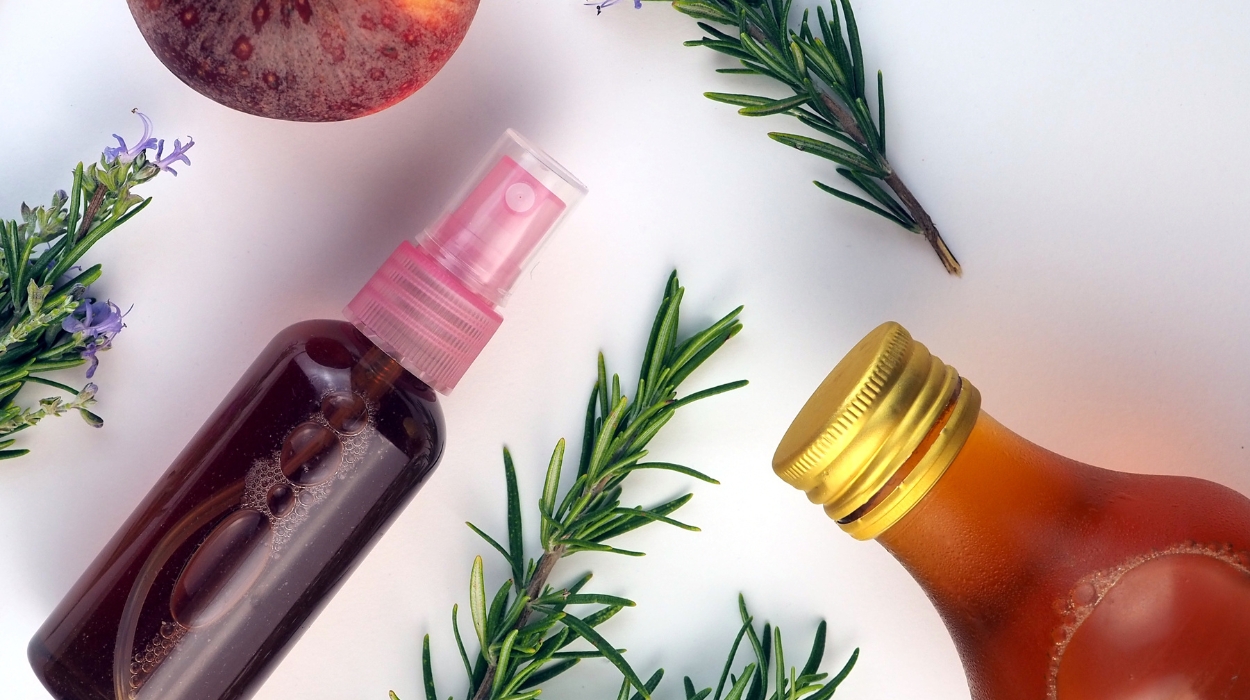 Expert's opinion
Expert's opinion
Expert's opinion
The article is a subjective view on this topic written by writers specializing in medical writing.
It may reflect on a personal journey surrounding struggles with an illness or medical condition, involve product comparisons, diet considerations, or other health-related opinions.
Although the view is entirely that of the writer, it is based on academic experiences and scientific research they have conducted; it is fact-checked by a team of degreed medical experts, and validated by sources attached to the article.
The numbers in parenthesis (1,2,3) will take you to clickable links to related scientific papers.
Apple Cider Vinegar Benefits For Skin: Benefits & Does It Work?

Apple cider vinegar, commonly referred to as ACV, has been used for over 10,000 years[1], in civilizations around the world. In the United States, apple cider vinegar has been used by medical professionals.
Today, apple cider vinegar’s benefits for the skin have become increasingly apparent. Cosmetic and skincare products use apple cider vinegar as an ingredient, and homemade mixtures with apple cider vinegar can easily be made. If you are making your mixture at home, it is important to ensure that you dilute it enough to avoid skin irritation and chemical burns.
Apple cider vinegar’s benefits for the skin include balancing the skin’s PH level, reducing bacteria, exfoliating the skin, promoting circulation, and reducing hyperpigmentation.
Apple Cider Vinegar Skin Benefits
Acne is a common skin concern for adolescents and adults. Acne is typically the result of your hair follicles getting clogged with oil and dead skin cells that lead to the growth of whiteheads, blackheads, and pimples.
Individuals who have acne-prone skin may find that using an apple cider vinegar mixture can help:
- Balance their skin’s PH level
- Antimicrobial Benefits
- Exfoliate their skin
- Promote circulation
- Reduce hyperpigmentation.
5 Apple Cider Vinegar Benefits For Skin
Apple cider vinegar has a variety of health benefits, including improving the health of our skin.
PH Level Of Skin
The PH level of your skin helps keep your skin moisturized, improving the protective skin barrier and keeping bacteria from staying on your skin to prevent skin infections. Research has shown[2] that our skin often falls between an acidity level of 4.0 and 7.0, with the natural level falling around 4.7 to 5. Your skin’s PH level can be impacted by makeup, other cosmetic products, and soaps that you use regularly.
Antimicrobial Benefits
Apple cider vinegar has antimicrobial properties that can help with a variety of concerns including warts[1]. For individuals who would like a natural treatment for warts, you should incorporate apple cider vinegar into your diet which shows promising results.
Exfoliate
The American Academy of Dermatology Association has indicated that while exfoliating your skin can improve its appearance for some, exfoliation is not good for each skin type. If you are familiar with the type of skin you have (sensitive, normal, dry, oily, or a combination), you can determine if exfoliation would be healthy for your skin. If you have any skin concerns or conditions, you should speak with your dermatologist before making changes to your skincare routine.
Promotes Circulation
Blood circulation within our skin is an important component of keeping our skin healthy. There are a number of factors that can impact our circulation including skin temperatures, moisture, pressure, age, and diabetes skin temperatures, moisture, pressure, age, and diabetes[3].
Reduce Hyperpigmentation
Hyperpigmentation refers to some areas of our skin that appear different from others. These areas may appear brown, black, red, or pink. According to the Cleveland Clinic, they are commonly referred to as age spots, liver spots, and sun spots. Apple cider vinegar can be used as a spot treatment for these skin imperfections to improve the appearance of your skin.
Is It Safe To Use On Your Skin?
Apple cider vinegar can be beneficial for our skin when used correctly. There are, however, things to be aware of before you begin using apple cider vinegar.
Apple cider vinegar is strong and acidic. Because of this, you should never use pure apple cider vinegar on your skin. Rather, diluting apple cider vinegar with water to avoid the harshness apple cider vinegar can cause. When you are applying the mixture to your skin, use caution to avoid irritation.
Atopic dermatitis is a skin condition where people develop itchy and inflamed skin. Apple cider vinegar was thought to help treat the symptoms of this by changing the microbiomes present on the child’s skin[4]. However, research has shown that daily soaking using 5% apple cider vinegar has no impact on the skin microbiome related to atopic dermatitis. More research is needed to determine the effectiveness of using a higher level of apple cider vinegar in atopic dermatitis.
You can experience skin irritation and chemical burns if using apple cider vinegar for skin tag removal. At this time, there is little to no evidence supporting the use of apple cider vinegar in the removal of skin tags.
If you have sensitive skin, or a known skin condition, speak with your healthcare provider before trying to use apple cider vinegar on your skin.
How To Use Apple Cider Vinegar On Skin?
Apple cider vinegar can be added to your skincare routine for additional benefits.
There are several ways that you can use apple cider vinegar for acne. This includes being used as a toner, face wash, and acne spot treatment. When using apple cider vinegar as a part of your skincare routine, take time to consider your unique skin type and the impact that it can have. Apple cider vinegar is quite acidic, and when used incorrectly, can cause more harm than good on your skin.
Apple Cider Vinegar Skin Care Products

Using an apple cider vinegar toner should be done with caution, as it can cause irritation and dry out your skin. You can dilute your solution to reduce the potency of the apple cider vinegar so that you can still receive apple cider vinegar benefits for the skin. When used as a toner, apple cider vinegar can be mixed with other ingredients including essential oils and vitamins.
Washing your face should be a part of your daily skincare routine to remove dirt, oil, and other impurities that you have acquired throughout your day. Apple cider vinegar with antibacterial and antifungal properties in facial cleanser helps decrease unwanted bacteria on your skin.
Since apple cider vinegar can help reduce hyperpigmentation, it can be used as a spot treatment for unwanted coloring in your skin. Additionally, spot treatments can also be used with minor blemishes and pimples.
Conclusion
Having healthy skin is a desirable quality for most of us. In general, if we believe that we look good, we tend to feel more comfortable in our skin. In addition to looking good, we can tell when our skin isn’t in its best form. We can experience acne, dry skin, and irritation. The apple cider vinegar benefits for the skin can be significant when it is used correctly.
Before you begin using an apple cider vinegar mixture, or a product with apple cider vinegar in it, it is important to consider your skin type. While the use of apple cider vinegar for skin has grown in popularity, it is not the best product for everyone to use. Some individuals do experience severe reactions such as irritation and chemical burns.
If you have a history of skin conditions or concerns, a wise decision would be to speak with your dermatologist or other healthcare provider about your interest in using apple cider vinegar, and any concerns you may have about how it can affect your skin.
+ 4 sources
Health Canal avoids using tertiary references. We have strict sourcing guidelines and rely on peer-reviewed studies, academic researches from medical associations and institutions. To ensure the accuracy of articles in Health Canal, you can read more about the editorial process here
- Budak, N.H., Elif Aykın, Atif Can Seydim, Greene, A.K. and Guzel-Seydim, Z.B. (2014). Functional Properties of Vinegar. [online] 79(5), pp.R757–R764. doi:https://doi.org/10.1111/1750-3841.12434.
- Lambers, H., Sofie Piessens, Bloem, A., Pronk, H. and Finkel, P. (2006). Natural skin surface pH is on average below 5, which is beneficial for its resident flora. [online] 28(5), pp.359–370. doi:https://doi.org/10.1111/j.1467-2494.2006.00344.x.
- Jerrold Scott Petrofsky (2016). Resting Blood Flow in the Skin: Does it Exist, and What is the Influence of Temperature, Aging, and Diabetes? – Jerrold Scott Petrofsky, 2012. [online] Journal of Diabetes Science and Technology. Available at: https://journals.sagepub.com/doi/10.1177/193229681200600324.
- Luu, L.A., Flowers, R.H., Gao, Y., Wu, M., Gasperino, S., Kellams, A., Preston, D.C., Zlotoff, B.J., Wisniewski, J.A. and Zeichner, S.L. (2021). Apple cider vinegar soaks do not alter the skin bacterial microbiome in atopic dermatitis. [online] 16(6), pp.e0252272–e0252272. doi:https://doi.org/10.1371/journal.pone.0252272.



